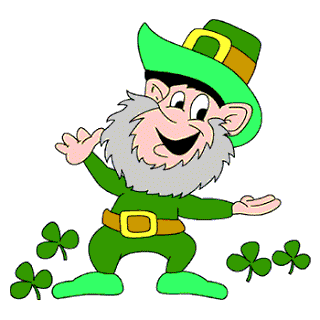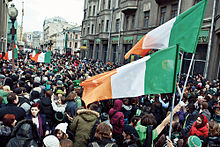
The History of St. Patrick's Day
Saint Patrick's Day, also called the Feast of Saint Patrick (from Irish: Lá Fhéile Pádraig, "the Day of the Festival of Patrick"), is held annually on 17 March, which is the traditionally accepted date of the death of Saint Patrick (c. AD 385-461), the patron saint of Ireland. Saint Patrick's Day is both a religious holiday, celebrating a Catholic Saint and a popular secular holiday, a celebration of Spring, music, beer, fun, comeraderie and Ireland. The day commemorates Saint Patrick and the arrival of Christianity in Ireland, but also and celebrates the heritage and culture of the Irish in general, especially among Irish living outside of Ireland and those of Irish descent. St. Patrick’s Day is also called the ‘National Hibernian Festival’ or ‘St. Patrick’s festival’
461 - Saint Patrick's death
Saint Patrick died in 461 AD atthe age of 76 in Ireland. He is credited with (largely) bringing Chrisianity to Ireland. For a biography of Saint Patrick, click here.
1600's - Churches establish a holiday
Saint Patrick's Day was first made an official Christian feast day in the early 17th century. It was observed by
- the Catholic Church,
- the Anglican Communion (especially the Church of Ireland)
- the Eastern Orthodox Church, and
- the Lutheran Church.
How is the holiday celebrated?
Celebrations usually public parades and
festivals, and the wearing of green attire or
shamrocks (like a 3-leafed-clover). Catholic Christians
may also attend church services and the Lenten restrictions on
eating and drinking alcohol are lifted for the day, which could be
argued helped to popularized the holiday and further the holiday's
tradition of alcohol consumption. Throughout the centuries, St. Patrick’s Day has been celebrated in various ways, including religious services,
horse races, banquets, parades, picnics, concerts, dancing and games. It has changed in form and tone over the century.
Where is St. Patrick's Day celebrated?
Saint Patrick's Day is a public holiday in
- the Republic of Ireland,
- Northern Ireland,
- the Canadian province of Newfoundland and Labrador, and
- the British Overseas Territory of Montserrat.
It is also popularly but unofficially celebrated around the world
among Irish expatri ate
and Irish descendent populations, especially in
ate
and Irish descendent populations, especially in
- Great Britain,
- Canada,
- the United States,
- Argentina,
- Australia,
- New Zealand.
- and to some extent, in many other countries.
Saint Patrick's Day is celebrated in more countries than any other national festival. Modern celebrations have taken on a populist, secular twist, centering around parades, green beer and partying.
Irish-American Presidents
There are at least 22 United States Presidents who have claimed Irish or Scots-Irish ancestry. Some who have very well-documented genealogy are:
Andrew Jackson, William McKinley, Woodrow Wilson, Ronald Reagan, and John F. Kennedy.
Next: The history of Saint Patrick
References:
- Traditional Green Plaid Kilt in Adult (men or women) Standard Size - Perfect for St. Patrick's Day and Irish Festivals & Celebration
- Womens Kilt Mini Skirt, Green Plaid
- Women's short kilt: Lucky Irish Green St. Patrick's Day Plaid Kilt, One Size
- Lingerie Lace Babydoll 2-Piece Sexy Bra and Panty Sets
- Green leprechaun hat and green beard on Amazon
- Perfect for St. Pat's Day: Beautiful Green Summer Pleated Spaghetti Strap Sleeveless Camisole Loose Fit Tank Tops for Women on Amazon
- Attractive, Classy, Sexy Women's Leprechaun Costume on Amazon
- Women's green Lingerie Lace Babydoll Chemise Halter Teddy Mesh Nightgown on Amazon
- St. Patrick's Day T-Shirt for Boys & Girls "Lucky Charmer" on Amazon
- St. Patrick’s Day Shamrock Green Velvet Top Hat for Men & Women on Amazon